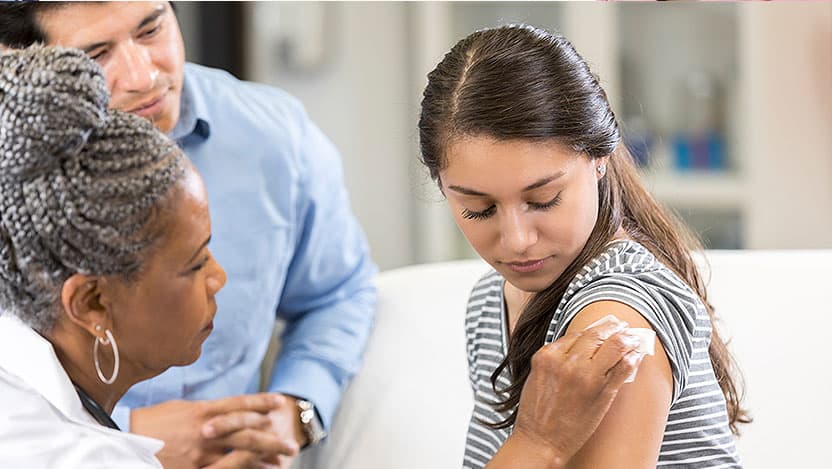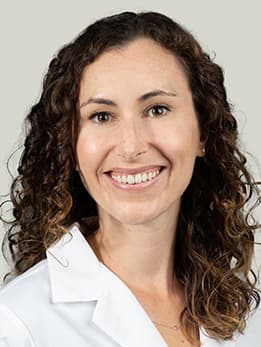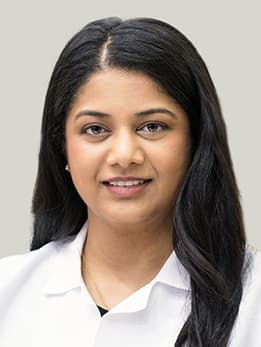Protecting teens and preteens from HPV-related cancers: What parents need to know about the vaccine, risk and more

The vaccine that prevents infection from human papillomavirus (HPV) is nothing short of a medical marvel. It is one of the most effective vaccines ever made against any disease or infection. It even prevents genital warts and several types of cancer.
Pediatricians and primary care providers should recommend the HPV vaccine for all teens and preteens. If not, we encourage parents to ask about the vaccine. While it may be a tough decision for some parents to choose vaccination, it could also be one that saves your child’s life.
What are the benefits of the HPV vaccine?
HPV is very common and approximately 85% of people are infected with HPV at some point in their life. Preteens, teens and young adults who are vaccinated against HPV can be spared some of the deadliest, most disfiguring and hard-to-treat cancers, including cancers of the cervix, vagina, vulva, penis, anus, mouth and throat. More than 90% of cancers caused by HPV can be prevented. That’s 29,000 cases of cancer per year.
Because HPV spreads through intimate skin-to-skin contact, the idea of vaccination may be an uncomfortable reminder that your child will eventually choose to express their sexuality. While it may be hard to think about your children becoming sexually active — whether that happens sooner or later — it is often harder for patients and families to manage a new cancer diagnosis, especially if it can be prevented.
HPV also causes genital warts. Although genital warts are not harmful in most people, they are chronic, lifelong infections that can be embarrassing and unsightly. In some cases, genital warts can be extremely painful and may require surgery to remove them. They can be very difficult to manage for people with autoimmune disorders or who take medications that compromise their immune system.
Even if your child is not yet sexually active, there is absolutely no downside to getting the HPV vaccine. The greatest benefit is preventing your child from getting a deadly or disfiguring cancer.
My child is not sexually active. Why should they get the HPV vaccine?
We recommend making sure your child is protected before they start having sex and have the potential for exposure to HPV. This way, whenever they’re ready, they’ll already be protected.
Some parents worry that vaccinating a child against HPV will encourage them to become sexually active earlier. However, studies show that children and teens who get the HPV vaccine don’t have sex sooner or engage in riskier sexual behaviors compared to unvaccinated peers.
What is the best age to get the HPV vaccine?
The recommended age for receiving the HPV vaccine is 11 or 12, when children are also scheduled to receive the Tdap (tetanus, diphtheria and pertussis) and meningitis vaccines. It can be given to children as young as nine as well. The HPV vaccine is recommended and effective up to age 26 and available for patients up to age 45.
For children and teens up to age 15, it’s a two-dose vaccine. The second dose is given six to 12 months after the first dose. At this age, children and teens have a more robust response to the vaccine and generate enough antibodies to protect against HPV after two immunizations. Like adults, teens older than age 15 need three doses to get the same immune response.
Consider vaccination early (age 11 or 12), as older teens may not want to wait six months or more to be fully immunized against HPV prior to becoming sexually active.
How safe is the HPV vaccine for children?
More than 270 million doses of the HPV vaccine have been distributed worldwide since 2006, and there have been no serious side effects. One study that examined data from more than 56 million doses of HPV vaccine administered in the U.S. found that some patients became dizzy or fainted 15 minutes after receiving the vaccine. Other patients had mild side effects typical of vaccines, such as fever, headache, and pain and redness at the injection site.
Are HPV and HPV-related cancers common?
HPV is the most common sexually transmitted infection. It’s spread by oral, vaginal and anal sex, but also by other intimate skin-to-skin contact. About 85% of people will be exposed to the virus in their lifetime.
HPV-related cancers are relatively uncommon because about 90% of infected people are able to clear the virus from their bodies before it causes cancer or precancer. Unfortunately, we don’t know which individuals will develop a persistent infection, so why take the risk when cancer can be the consequence?
Should boys get the HPV vaccine?
Yes, the HPV vaccine is recommended for boys and men too. When the U.S. Food and Drug Administration approved the HPV vaccine in 2006, it was recommended for girls and women to protect against cervical cancer. Three years later, the vaccine was approved for boys and men, based on evidence that males are also susceptible to HPV-related cancers. HPV vaccination is recommended for boys and girls at the same age
Cancers caused by HPV affect women and men in equal numbers. Each year, there are approximately 10,800 cases of cervical cancer diagnosed in women, and 9,600 cases of head and neck cancer diagnosed in men. And while there is a screening test for cervical cancer to catch and treat it early, there are no such screening tests for the other HPV-related cancers. Because most HPV infections are asymptomatic, people may unknowingly transmit the infection to their sexual partners.
Do condoms help with HPV?
Condoms reduce but don’t eliminate the risk of HPV infections, because the virus lives in both oral and genital tissues. Condoms do not cover the entire genital area; nor do they protect same-sex female partners from contracting the virus, which often causes no symptoms until precancerous lesions or cancer shows up years later.
However, out of the 150-plus strains of HPV, the vaccine targets the most common and harmful ones: two strains that cause genital warts and seven strains that cause various types of cancer.
Ask your health care provider today about getting the HPV vaccine.

Lindsey Eastman, MD
Lindsey Eastman, MD, is board-certified in obstetrics and gynecology and specializes in a wide range of conditions that impact women. Dr. Eastman enjoys caring for women throughout their lives, from the first gynecologic exam to menopause and more.
Learn more about Dr. Eastman
About Shashwati Pradhan, MD
Shashwati Pradhan, MD, is a pediatric and adolescent gynecologist. She specializes in helping children, teens and young adults navigate gynecologic conditions while minimizing nervousness, embarrassment and worry.
Learn more about Dr. Pradhan